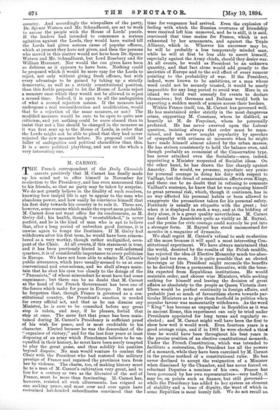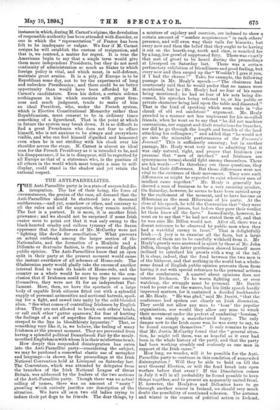M. CARNOT. T HE French correspondent of the Daily Chronicle asserts
positively that M. Carnot has finally made up his mind not to offer himself in November for re-election to the Presidency, and has even announced this to his friends, so that no party may be taken by surprise. We do not greatly believe in the finality of such resolves, knowing how insipid life is apt to appear to the man who abandons power, and how easily he convinces himself that his first duty towards his country is to rule it. There are, however, some reasons which make the report seem probable. M. Carnet does not want office for its emoluments, as M. Grey), did ; his health, though "re-established," is never perfect, and he is the kind of man who is apt to believe that, after a long period of unbroken good fortune, it is unwise again to tempt the Destinies. If M. Grilvy had withdrawn after his first term, he would have been remem- bered as a very worthy, though rather undignified, occu- pant of the Chair. At all events, if this statement is true, and it has been previously hinted in very well-informed quarters, it is of considerable importance to every politician in Europe. We have not been able to admire M. Carnot's public utterances, which have usually seemed to us at once conventional and over-solemn, and we shall always main- tain that he shut his eyes too closely to the doings of the " Panamists," of whose misconduct he must have had some 'cognisance; but there can be no doubt that M. Carnot at the head of the French Government has been one of -the forces which make for peace in Europe. It must not be forgotten that, though France is governed as a con- stitutional country, the President's sanction is needed for every official act, and that as he can dismiss any Minister, he is sure to be consulted before any great step is taken, and may, if he pleases, forbid that step at once. The mere fact that peace has been main- tained during M. Carnot's Presidency is sufficient proof of his wish for peace, and is most creditable to his character. Elected because he was the descendant of the "organiser of victory," and for the last four years at least disposing of an army which Frenchmen believe to be un- equalled in their history, he must have been sorely tempted to play the great game, and thus solidify his position beyond dispute. No man would venture to contest the Chair with the President who had restored the military prestige of France and regained the provinces torn from her by violence. The charm, too, of making history must be to a man of M. Carnot's cultivation very great, and to live for a century or two as the liberator of the soil of France, must be more than fascinating. M. Carnot has, however,. resisted all such allurements, has reigned as one seeking peace, and must over and over again have restrained hot-headed subordinates convinced that the time for vengeance had arrived. Even the explosion of feeling with which the Russian overtures of friendship were received left him unmoved, and he is still, it is said, convinced that time makes for France, which is not exhausted by her armaments, and against the Triple Alliance, which is. Whoever his successor may be, he will be probably a less temperately minded man, while he will at first be less able to assert himself, especially against the Army chiefs, should they desire war. At all events, he would as President be an unknown quantity, and that fact alone would add greatly to the anxieties of Europe and to the evil effect of every rumour pointing to the probability of war. If the President, indeed, were known to be ambitious, or a man whose word could not be securely trusted, it would be nearly impossible for any long period to avoid war. Here in an island we could wait serenely for events to declare themselves ; but Germans and Italians would both be expecting a sudden march of armies across their borders. Within France itself, too, M. Carnot has governed well. He has maintained order strictly in the most dangerous crises, supporting M. Constans, whom he disliked, as heartily as M. de Freyeinet, whom he personally preferred. He has never swerved upon the Labour question, insisting always that order must be main- tained, and has never sought popularity by speeches of sympathy with artisans at moments when he might have made himself almost adored by the urban masses. He has striven consistently to hold the balance even, and though probably an economist of the Conservative type, has never attacked even the Socialists—once, indeed, appointing a Minister suspected of Socialist ideas. On the other hand, he has drawn the line sharply against Anarchy. He would, we presume, repudiate any praise for personal courage in doing his duty with respect to Valliant, but the dread of assassination affects even Kings, and there can be no doubt that in refusing to commute Vaillant's sentence, he knew that he was exposing himself to great personal risk, which, though it continues, has in no way affected his personal habits or been allowed to exaggerate the precautions taken for his personal safety. Fortitude is usually an etiquette with the great ; but when it is displayed in such a way, and at the bidding of duty alone, it is a great quality nevertheless. M. Carnot has dared the Anarchists quite as visibly as M. Raynal, and the praise for civic courage could scarcely be put into a stronger form. M. Raynal has stood unconcerned for months in a magazine of dynamite.
We shall regret M. Carnot's refusal to seek re-election all the more because it will spoil a most interesting Con- stitutional experiment. We have always maintained that the world, deceived by the results of the Polish muddle, has rejected the idea of Elective Monarchy much too abso- lutely and too soon. It is quite possible that an elected Sovereign or life President might reconcile the benefits to be derived from a permanent Executive, with the bene- fits expected from Republican institutions. He would maintain order, and choose wise Ministers, while seeking nothing for himself and leaving the decision of great affairs as absolutely to the people as Queen Victoria does There would be perfect continuity in foreign affairs, and probably just so much of favouritism shown towards par- ticular Ministers as to give them foothold in politics when popular favour was momentarily withdrawn. As the word " King " has become as unpopular in Republics as it was in ancient Rome, this experiment can only be tried under Presidents appointed for long terms and regularly re- elected ; and M. Carnot might well have been the first to show how well it would work. Even fourteen years is a good average reign, and if in 1901 he were elected a thin] time he would have been throughout his best years in the precise position of an elective constitutional monarch. Under the French Constitution, which was intended to facilitate a restoration, the President has all the powers of a monarch, while they have been exercised by M. Carnot in the precise method of a constitutional ruler. He has never declined to accept the resignation of a Minister when dismissed by the Chamber, and has never forced on reluctant Deputies a nominee of his own. France has been governed by her own representatives—very badly, it may be, on points such as finance, but still governed— while the Presidency has added to her system an element of stability and a tone of dignity, the want of which in some Republics is most keenly felt. We do not recall an instance in which, during M. Carnot's r6gime, the devolution of responsible authority has been attended with disorder, or one in which the " representation " of France has been felt to be inadequate or vulgar. We fear if M. Camot resigns he will establish the custom of resignation, and that is, we contend, a matter for regret. It is true the Americans begin to say that a single term would give them more independent Presidents, but they do not need continuity of administration so much as States to which foreign policy is vital, and which must, in self-defence, maintain great armies. It is a pity, if Europe is to be Republican some day, not to try the experiment of long and unbroken Presidencies ; and there could be no better opportunity than would have been afforded by M. Carnot's candidature. Even his defect, a. certain solemn nothingness in him which coexists with great firm- ness and much judgment, tends to make of him an ideal President, who, under the French system, which is Elective Constitutional Monarchy rather than Republicanism, must consent to be in ordinary times something of a figurehead. That is the point at which in future the system may break down. It is so difficult to find a great Frenchman who does not fear to efface himself, who is not anxious to be always and everywhere visible, and who can feel himself dignified and honoured even when he is not striding with his cloak over his shoulder across the stage. M. Carnot is almost an ideal man for the French Presidency as it is intended to be, and his disappearance, if he is to disappear, will be regretted by all Europe as that of a statesman who, in the position of all others in the world which most tempts a man to self- display, could stand in the shadow and yet retain the national respect.







































 Previous page
Previous page